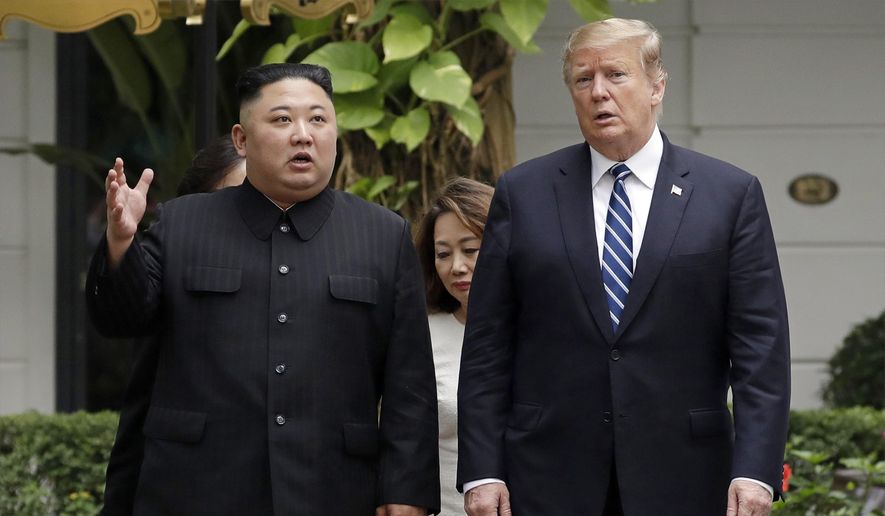President Trump left heads spinning by deciding to cancel sanctions that the Treasury Department had intended to impose on North Korea.
Mr. Trump announced the turnabout in a tweet mid-Friday, sparking widespread confusion because it was unclear which sanctions he wanted to roll back — and why he decided to undercut his top deputies.
“It was announced today by the U.S. Treasury that additional large scale Sanctions would be added to those already existing Sanctions on North Korea. I have today ordered the withdrawal of those additional Sanctions!” Mr. Trump tweeted.
The Treasury did announce new sanctions on Friday, though they applied to Iran and a national bank in Venezuela, as the administration ramps up pressure on strongman Nicolas Maduro.
The Treasury’s latest decision on North Korea happened Thursday, when it decided to blacklist two Chinese shipping companies for helping North Korea evade sanctions.
Many thought Mr. Trump was referring to this action, though the administration signaled that Mr. Trump was referring to future sanctions that Treasury intended to impose but hadn’t formally unveiled.
Mr. Trump said he saw no need for a crackdown as he tries to build his relationship with North Korean Leader Kim Jong-un and denuclearize the Korean peninsula. A recent summit between the two leaders in Hanoi, Vietnam, ended without a deal, though the president is trying to maintain the relationship.
“President Trump likes Chairman Kim and he doesn’t think these sanctions will be necessary.” White House Press Secretary Sarah Sanders said, without elaborating on the targeted sanctions.
Democrats were incensed, saying sanctions are carefully crafted and that the president’s u-turn makes the U.S. look foolish on the world stage.
“Career experts at the Treasury Department undertake a painstaking process before imposing sanctions,” said Sen. Ron Wyden, Oregon Democrat. “For Donald Trump to overturn their decision via tweet because he has an inexplicable fondness for one of the world’s most brutal dictators is appalling.”
The Democratic National Committee dubbed the turnabout “insane” and the House Foreign Affairs Committee said decisions like these shouldn’t be made on the fly. Republicans were left scratching their heads, too, saying sanctions are carefully vetted.
“I don’t know why he would do that or why it happened the way it did. It’s unusual. It’s never happened before,” Sen. Marco Rubio, Florida Republican, told NBC’s “Meet the Press” on Sunday. “I don’t know how they issued this and then suddenly he changed his mind. I don’t know the rationale behind it. Maybe it was a good reason. But it certainly is not the way it’s normally done.”
It’s not the first time Congress sparred with Mr. Trump over sanctions or other punitive measures against foreign actors.
The president signed new sanctions on Russia and other countries into law in August 2017, though did so reluctantly, saying Congress overstepped in passing the measure.
“While I favor tough measures to punish and deter aggressive and destabilizing behavior by Iran, North Korea, and Russia, this legislation is significantly flawed,” he said in a signing statement. “In its haste to pass this legislation, the Congress included a number of clearly unconstitutional provisions.”
Lawmakers also pushed back at Mr. Trump’s decision in 2018 to lift a ban on Chinese company ZTE from acquiring U.S. parts and software. The company agreed to pay a penalty in a settlement to reverse the ban, which was imposed after the company was caused of violating U.S. sanctions on Iran and North Korea.
• Tom Howell Jr. can be reached at thowell@washingtontimes.com.




Please read our comment policy before commenting.